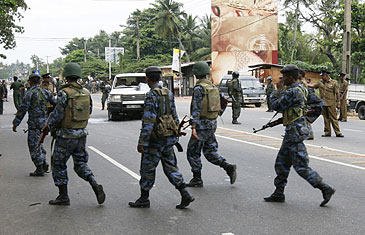From a military perspective, the gains made by the government security forces have been extraordinary. The LTTE are currently restricted to less than 250 square kilometers of land, after controlling more than 18,000 square kilometers in 2006. In the country’s recent Independence Day celebrations, President Rajapaksa claimed the war would be over within days. Nevertheless, the army commander concedes that the LTTE may revert to guerilla warfare and that pockets of resistance are likely to remain.
Politically speaking, what does these recent developments mean? There is a strong possibility that elections will be called in the near future and if so, the incumbent party is likely to win with a strong mandate. Moreover, the potential end of Asia’s longest war is predicted to trump voter concerns about the economy, accusations of human rights violations by the military, the murder and harassment of journalists and alleged corruption in government institutions.
A major concern will be the plight of the Tamils. If the LTTE are eliminated as a politico-military force, then there is the potential that the government will not adequately address their grievances.
This appears unlikely, especially given the influence of the international community and India in particular. President Rajapaksa has agreed to implement an Indian-mediated 1987 accord that devolves power to local governments. The Sri Lankan President has pledged that democracy will be restored in the north as well.
Finally, what of the country’s economic future? During the years it has been at war, the Sri Lankan economy has shown itself to be resilient.
If hostilities do cease, the country has great potential. With free education, very high literacy rates and a strong expatriate community, the country has the human resources to succeed economically. LTTE-controlled areas were the most fertile for agriculture and there have been reports of oil deposits in the seas near previous conflict areas. Assuming the global economy improves, tourism to Sri Lanka is also likely to expand.

